Have Sword, Will Travel Read online
Page 3
They would follow the river path upstream, along the riverbank through undergrowth and the occasional stand of willows or alders. Eleanor didn’t hesitate, setting off without a backward glance. After one last look across the mud at Dragonfoot Hole, Odo followed. Sooner started, sooner finished, his father liked to say. That probably applied to adventures too.
“How long do you think this will take?” he asked, wondering how soon he could be rid of the sword.
“Depends on where the blockage is,” said Eleanor, flicking at dandelions with a thin stick. “Might be days away. Weeks, even.”
Odo swallowed a sudden lump in his throat. “It’d be much quicker if we had a horse.”
“Or maybe we should grow wings and fly instead?”
“No need to be sarcastical. I just thought … I mean, weeks …”
Eleanor looked back over her shoulder. Her oldest friend was downcast, but she refused to let him spoil her mood. Which meant finding some way to cheer him up.
“It probably won’t be weeks. Biter, what do you think?”
The sword’s emerald suddenly flashed as it caught the afternoon sunlight, uncannily as though it had turned its attention to her.
“A laden knight will travel four leagues per day on foot by good path or road. As we progress, we will naturally uncover information regarding the location of the river’s trouble. That will allow Sir Odo to determine the length of our journey and our quest.”
“Ain’t that right, Sir Odo?” Eleanor asked him. “No point being all gloomy until we know something about anything.”
Odo nodded. A shadow passed over him, making him blink and look up. They were walking under the Big Bough from which Lenburh children had dropped into the river for generations. All they would drop into now would be stinking mud.
Fix the river, he reminded himself. Then you can retire.
“I guess we should start looking for people coming the other way,” he said. “They might know where the blockage is.”
“We’re bound to come across someone soon,” Eleanor said, squinting up the path to where it vanished behind a bend in the river. There could be dozens of people beyond that point, for all she could tell.
Only there wasn’t anyone there, either, just another stretch of river she had explored many times before. Although beyond the boundaries of the village, it still fell under the patronage of Sir Halfdan. The aging knight didn’t own it, but in theory he would defend it from attack. Not that he had been doing much defending of late, Eleanor thought. All he did was raise a toast at the harvest festival and hand out the mostly edible or drinkable prizes. To be fair, though, there hadn’t been any attacks in living memory for him to guard against. Lenburh was a peaceful place.
She wondered if a drought counted as an attack. It probably depended on the cause. If it did, she swore she would do her best to help Odo overcome it, and thereby prove her worthiness as a knight in her own right so she could have Biter when Odo retired.
They turned another bend. Still no travelers to be seen, just a stand of weeping willows that Eleanor knew slightly less well than those closer to home. Their long, slender fingers swayed from side to side as though seeking the river that now lay out of their reach.
“Can I ask you a question, Biter?” Odo said.
“Ask away, Sir Odo.”
“Why didn’t you know the name of our village?”
“Good question,” Eleanor said. “Were you washed downstream from somewhere else, or were you just not paying attention when you went into the water?”
“Hard thing to miss, an entire village,” said Odo.
The sword shifted minutely in the scabbard, making a small grating noise like the clearing of a throat.
“The exact circumstances of my submerging are … unclear to me,” Biter said.
“Does that mean you don’t remember?” asked Eleanor. Clouded, he had said of his memories when they had found him. It struck her as strange that a sword could be forgetful, but no less strange than that a sword could talk.
“It is possible the knowledge was taken from me,” the sword said, “by means of darkest sorcery.”
“Why?” asked Odo. “How?”
“That I do not know.”
“More likely you just forgot,” said Eleanor. “How old are you, anyway?”
“If I knew how long I slept in the water I could tell you the answer,” said the sword.
“Well, what’s the last year you remember?”
“Year four seventy-nine in the Calendar of Nobles.”
Neither Odo nor Eleanor knew what that was.
“Year seventeen of the rule of King Sherwyn?” Biter tried again.
“Do you mean Sherwyn the Seventh?” asked Odo, who had learned a little history from his oldest brother’s books. King Sherwyn the Seventh had gone steadily madder and madder until he’d ordered his army to march off a cliff, at which point the soldiers turned around and had him deposed. Armies didn’t usually depose kings, Odo had learned from that story; Sherwyn the Seventh was the exception.
“There was no seventh,” said Biter. “He was the first of his name.”
“But obviously not the last.” Eleanor asked Odo, “How long between the First and the Seventh?”
Odo shrugged, making the packs on his shoulders rise up and then down. “I don’t know. I think Sherwyn the Seventh was about three hundred years ago.”
They walked in silence for a long moment, but not as long as three centuries spent at the bottom of a river.
“There were eels. So many eels,” said the sword. “My sleep was very deep, and my dreams only of eels.”
“Lenburh probably didn’t exist more than three hundred years ago,” said Eleanor. “That would explain why you don’t remember it.”
Odo wasn’t so sure. Lenburh had always existed, in his mind, and always would exist unless the river stopped running for good. Another possible explanation for Biter’s amnesia that no one had raised was that Biter was lying. But why would a sword lie about how it had come to be imprisoned in mud, far from its rightful owner? Out of embarrassment?
Or perhaps something more sinister?
“I believe your explanation is correct, Squire Eleanor,” Biter said, prompting a look of combined satisfaction and resentment from the girl. It was one thing to be praised by the magic sword, another to be reminded of her place in the order of things. At least, she reassured herself, it was only temporary. “Let us move on to more practical matters. Sir Odo, I am keen to know the details of your training. Clearly you lack experience with a sword of my repute, but what about the arming sword or riding sword? And the lance — let us not forget that. How progressed is your tilting?”
“Ah,” said Odo, shifting the packs again. He was starting to feel their weight now. “Progressed? Not as such. Not progressed at all, to be honest.”
“The short blade? Dagger wielding? Shieldwork, at least?”
“Biter, you dullwit,” said Eleanor, “we keep telling you: You’ve got the wrong person. Odo’s good at numbers, sewing, and lifting heavy things, whereas I —”
“Then we have much to do!” The sword shot out of the scabbard with the sound of a razor across a strop. “We will commence with blocks and move on to parries. I will demonstrate the motion as we walk. Later, while your squire makes camp, we will practice in earnest. Attend!”
Eleanor ground her teeth as the sword darted and stabbed in a series of elegant moves that Odo did his best to follow. But Eleanor didn’t look away. Patiently and methodically, fingers twitching with every imagined move, she committed the feints and blocks to memory.
Soon, she swore, it would be her turn.
Odo didn’t know exactly when they left the purlieu of Lenburh and entered unknown territory. The river wound more or less northward through an unchanging landscape, home to birds, badgers, and a variety of placid snakes. It wasn’t until the sun dipped low into the trees on the opposite bank and Eleanor suggested finding a clearing off the path for
the night that he wondered how far away home lay.
And then there wasn’t time to think at all.
“Demonstrate the Five Lethal Forms,” the sword ordered him while Eleanor set up the camp, “as I instructed you earlier.”
The sword swung him bodily from side to side, supernaturally strong and impossible to resist, crying “Have at you!” and “Avaunt!” to imaginary foes as he went. Odo tried to keep up, but really there was little more he could do than hang on and hope he didn’t hurt himself.
When Eleanor could take it no longer she said, “If you’re going to swing that thing around, make yourself useful and cut some firewood.”
“Do not mistake me for an axe, squire. My edge must not be blunted upon timber —”
“I’ll see what I can find,” said Odo. “Come on, Biter. We can at least collect kindling together.”
He nodded at Eleanor in gratitude for the chance to catch his breath, but she had already turned away and was moodily sorting through their supplies.
“Squires kept a civil tongue in my day,” grumbled Biter as Odo rummaged through the undergrowth in search of fallen logs.
“Oh, you remember them, do you?”
“With perfect clarity. There was one belonging to Sir Wylie, who had an extraordinary nose for bandits. She could sniff them out clear across a forest, allowing her master to ambush them long before they bothered her holdings. A splendid young woman. Shame about the crossbow bolt …”
Odo soon learned that most of Biter’s reminiscences ended rather bloodily, as did life for a hare that happened to cross their path. The sword moved in Odo’s hand and neatly severed the small animal’s neck before Odo even noticed it was there.
“Dinner!” Odo told Eleanor as he staggered back into the clearing under an armful of wood with the small corpse balanced on top.
“Good work,” she told them. “I’ll clean it. You cook.”
“Done.”
“I will need cleaning also,” said the sword, sticking itself point-first into the earth near where Eleanor had cleared fallen leaves for the fire.
“I’ll get to you in turn,” said Eleanor, pretending gruffness although she didn’t mind. She had yet to touch the sword and was looking forward to examining it more closely. Its steel had an opalescent quality that warranted study, and there were swirling patterns in the metal.
While Eleanor skinned and cleaned the hare, Odo lit the fire and laid out the cooking utensils Symon had given them. Soon he had the animal roasting on a makeshift spit over a steady flame with a pot of root vegetables stewing on coals nearby. He had often cooked for his family, but somehow this smelled better than anything he had made before. For the first time that day he felt something like contentment, a feeling mirrored on Eleanor’s face as she sharpened and oiled the sword. She was thinking about the adventures that lay ahead, once they fixed the river and she became a knight. Sir Eleanor had an excellent ring to it.
Biter emitted a low hum of contentment, like a cat. “A little higher … no, below the cross-guard … perfect!”
“Do you know how many people you’ve killed, Biter?” she asked him.
“None,” said the sword.
“What?”
“I have killed no one. The knights I have served, however, have slain many.”
“Oh.”
“A sword cannot kill of its own volition. We are the wielded, not the wielder.”
Odo filed this away for future reference. If he had known this when they’d first found Biter, he wouldn’t have been so afraid of having his neck cut through.
“So tell us about your knights, then,” said Eleanor, eyes gleaming with the same light as the newly polished sword. “Who was your last one? What happened to her?”
“Sir Nerian was his name. He was strong of heart and mighty of arm. Together we quelled a rebellion against King Sherwyn in the north … or was it the south? The finer details of the campaign elude me for the moment … As to his fate, I’m afraid I can’t remember anything at all …”
Out in the darkness surrounding their campfire, a twig snapped.
Biter swept out of Eleanor’s grasp and through the fire, scattering the hare and spit in a shower of sparks. Odo raised a hand to defend himself, and found himself holding the sword instead. It yanked him to his feet.
“What —?”
“Who goes there?” the sword called.
“A humble traveler who smells your dinner,” came a reply from the shadows.
“Approach!”
The bushes parted, allowing a rumpled, grandfatherly figure to step into the light. Dressed in sun-bleached garb that had seen more than its fair share of the road, the man had a long, peppery beard tied in decorative knots. He carried a pack that towered high above his head, adorned with elaborate needlework.
“Didn’t mean to startle you,” the apparition said. “I have acorns and some dried apple if you’re willing to trade.”
Eleanor lowered only slightly the paring knife she had scooped up from the cutlery by the fire. “What’s your name? Where are you from?”
“Call me Firman. I’m headed south from Nægleborg and hoping to find better fortune on the way.”
Neither Eleanor nor Odo knew the man’s hometown, but both noted Firman’s direction. If he was headed south, that meant he came from the north and might have news of the river.
“I guess we can spare some hare,” Odo said, tugging the sword down, or trying to. The sword resisted.
“Come on, Biter,” he hissed. “Be reasonable.”
“Advance two paces,” the sword ordered Firman. “You may sit there. Come no closer or you will feel my sting.”
“Ah!” The traveler nearly jumped out of his skin. “That sword … it talked!”
“It’s enchanted,” Eleanor explained. “It can move on its own too, if you give it reason to.”
“I won’t.”
Watching Biter the whole time, Firman warily did as he was told, busying himself first with the unfastening and lowering of his pack, then with sighing and rubbing his shoulders. “Who else do I have the pleasure of meeting on this long and winding road?”
“Sir Odo,” said Biter, “and his squire, Eleanor.”
Firman’s eyebrows went up. “A knight, eh? That explains the sword. But where’s your pavilion? Your coterie? I thought knights ate stags on spits with sugared swans for dessert.” He smiled.
Biter made a sound that might have been a wistful sigh. Eleanor decided she would trust Firman for the moment. Slipping the knife into her boot, she reconstructed the spit, brushed the dirt from the partially cooked hare, and put it back over the fire.
“What do you do?” she asked.
“I’m a forester,” Firman said. “If ever you go to Nægleborg I am sure they will speak well of me there.”
Again, that smile. Odo couldn’t tell if Firman was laughing with them or at them.
“Sir Odo is a knight-errant,” said Biter, “pursuing his first campaign.”
“Well, good luck to you,” said the man, before Odo could add “and last campaign.” Firman pulled a cloth bag from his pack and unfolded it to reveal the promised acorns and dried apple. “You’ll find plenty to do the way you’re headed.”
“Do tell,” said Eleanor, leaning forward and cupping her hands around her knees.
“It’s the river,” he said. “It’s drying up.”
“Yes, we noticed. We’re going to fix it.”
“It’s going to get worse. There’s no more water coming down at all — this is just the dregs. It must be completely blocked somewhere north of here. Already people are guarding the few wells about as if they gave gold, not water.”
“Do you know what’s stopped the river?” Odo asked. “And where?”
“No. North, that’s all. I’ve heard something’s happened in the mountains, but I haven’t been there myself. Why would I? I’m heading for greener regions. Trees die where there’s no water. A man’s got to earn a livelihood and all a
long here will be a desert in a few years.”
Odo and Eleanor looked at each other, both thinking of dying trees and the land turning dead and brown.
“How far are the mountains from here?” asked Odo.
Firman shrugged. “I never went there. A few weeks, afoot. I suppose you don’t have a horse tied up somewhere?”
Odo shook his head and tried not to look disappointed. He had hoped for a destination closer than the mountains.
“Trees won’t be the only things that will die with the river,” he said. “We want to save our village, along with all the others in danger.”
Firman smiled. “That is a noble quest, Sir Knight. May good fortune find you. You’ll need it.”
The hare was ready. Eleanor cut it into pieces, speared each one with a broken stick, and handed them around. They ate in silence, wrapped up in their thoughts as the fire crackled and popped, casting light that danced across the sword’s newly polished steel. Eleanor wondered if Biter was thinking about the pavilions he might have enjoyed in his past life, perhaps resenting the privations he was forced to endure now. Odo worried at the scab that had formed over the cut on his finger, hoping it wouldn’t fester.
“There’s one other thing,” Firman said when the meal was done. “I’ve been wondering if I should tell you, but it would be remiss of me not to, given where you’re headed and what you attempt. There’s a rumor … no, not even that. A name … a name I keep hearing whenever anyone talks about the river, as though it could be connected to the blockage, perhaps even the cause. It’s an old name. You probably don’t know it …”
“Tell us the name,” said Eleanor.
“Quenwulf.”
Biter’s emerald flashed in recognition. “Quenwulf the dragon?”
“Yes,” said Firman. “The dragon.”
Quenwulf the dragon!
Even Odo and Eleanor knew that name. Everyone knew it. Quenwulf was an ancient and terrible beast, and her name was one to frighten children with. She was a creature who had done almost every terrible thing anyone cared to mention. She had razed towns to the ground, eaten armies whole, defeated every hero sent against her. Not that anyone was ever very clear about where these things had happened, or when. Somewhere else and long ago, thankfully.

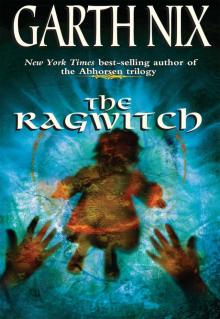 The Ragwitch
The Ragwitch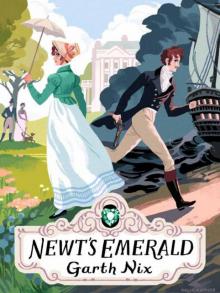 Newt's Emerald
Newt's Emerald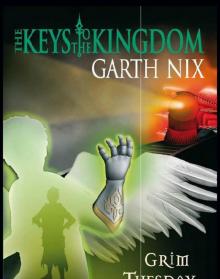 Grim Tuesday
Grim Tuesday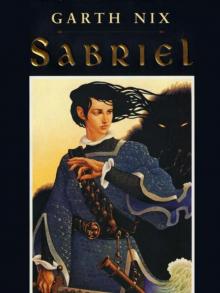 Sabriel
Sabriel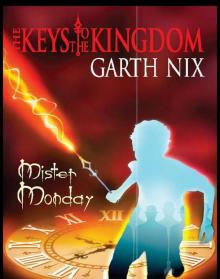 Mister Monday
Mister Monday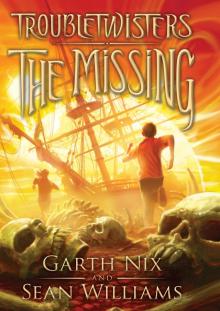 The Missing
The Missing The Fall
The Fall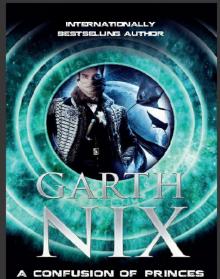 A Confusion of Princes
A Confusion of Princes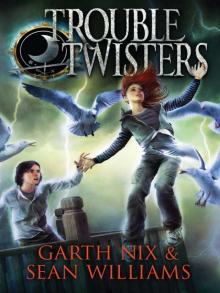 Troubletwisters
Troubletwisters Lirael
Lirael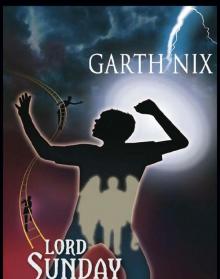 Lord Sunday
Lord Sunday Clariel
Clariel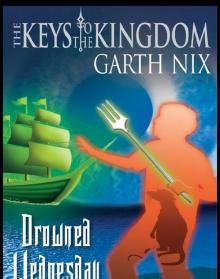 Drowned Wednesday
Drowned Wednesday Shade's Children
Shade's Children The Violet Keystone
The Violet Keystone Abhorsen
Abhorsen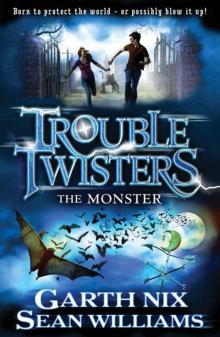 The Monster
The Monster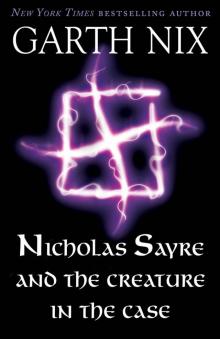 The Creature in the Case
The Creature in the Case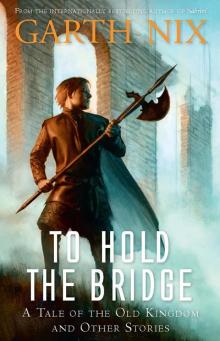 To Hold the Bridge
To Hold the Bridge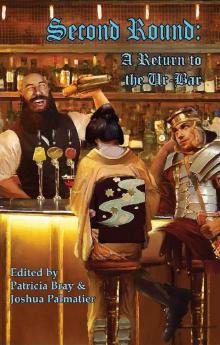 Second Round: A Return to the Ur-Bar
Second Round: A Return to the Ur-Bar Above the Veil
Above the Veil Aenir
Aenir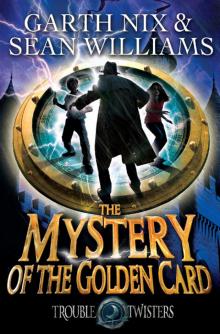 Mystery of the Golden Card
Mystery of the Golden Card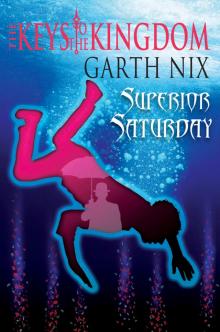 Superior Saturday
Superior Saturday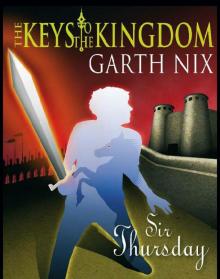 Sir Thursday
Sir Thursday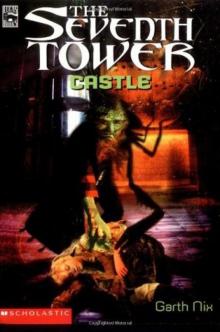 Castle
Castle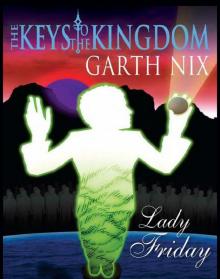 Lady Friday
Lady Friday Into Battle
Into Battle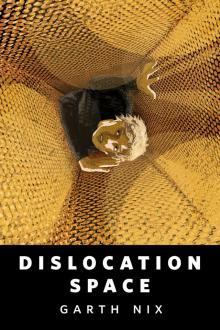 Dislocation Space
Dislocation Space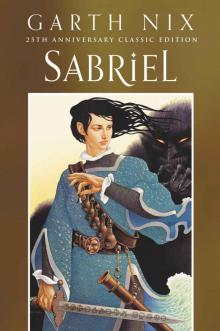 Sabriel (Old Kingdom Book 1)
Sabriel (Old Kingdom Book 1) Sir Hereward and Mister Fitz Go to War Again shamf-1
Sir Hereward and Mister Fitz Go to War Again shamf-1 The Left-Handed Booksellers of London
The Left-Handed Booksellers of London Novel - A Confusion of Princes
Novel - A Confusion of Princes One Beastly Beast
One Beastly Beast A Suitable Present for a Sorcerous Puppet shamf-3
A Suitable Present for a Sorcerous Puppet shamf-3 Beyond the Sea Gates of the Scholar Pirates of Sarsköe shamf-2
Beyond the Sea Gates of the Scholar Pirates of Sarsköe shamf-2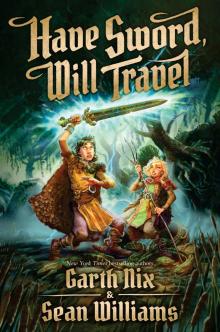 Have Sword, Will Travel
Have Sword, Will Travel Fire Above, Fire Below
Fire Above, Fire Below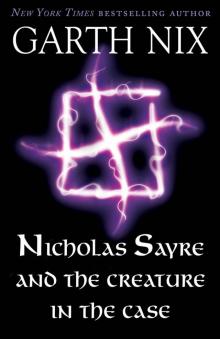 Nicholas Sayre and the Creature in the Case
Nicholas Sayre and the Creature in the Case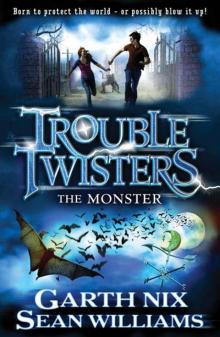 The Monster (Troubletwisters)
The Monster (Troubletwisters) Across the Wall
Across the Wall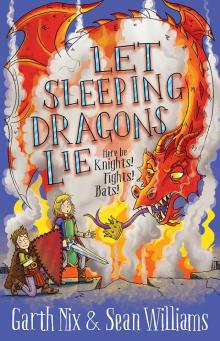 Let Sleeping Dragons Lie
Let Sleeping Dragons Lie![[Abhorsen 03a] - Across the Wall Read online](http://i1.bookreadfree.com/i2/04/12/abhorsen_03a_-_across_the_wall_preview.jpg) [Abhorsen 03a] - Across the Wall
[Abhorsen 03a] - Across the Wall